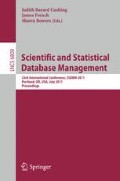Abstract
Trajectory data streams are huge amounts of data pertaining to time and position of moving objects. They are continuously generated by different sources exploiting a wide variety of technologies (e.g., RFID tags, GPS, GSM networks). Mining such amounts of data is challenging, since the possibility to extract useful information from this peculiar kind of data is crucial in many application scenarios such as vehicle traffic management, hand-off in cellular networks, supply chain management. Moreover, spatial data streams poses interesting challenges both for their proper definition and acquisition, thus making the mining process harder than for classical point data. In this paper, we address the problem of trajectory data streams clustering, that revealed really challenging as we deal with data (trajectories) for which the order of elements is relevant.
Access this chapter
Tax calculation will be finalised at checkout
Purchases are for personal use only
References
Ester, M., Kriegel, H.P., Sander, J., Xu, X.: A density-based algorithm for discovering clusters in large spatial databases with noise. In: KDD 1996 (1996)
Giannotti, F., Nanni, M., Pinelli, F., Pedreschi, D.: Trajectory pattern mining. In: KDD 2007, pp. 330–339 (2007)
Han, J., Kamber, M.: Data Mining: Concepts and Techniques. Morgan Kaufmann, San Francisco (2000)
Lee, J.G., Han, J., Li, X., Gonzalez, H.: TraClass: trajectory classification using hierarchical region-based and trajectory-based clustering. PVLDB 1(1) (2008)
Li, Z., Lee, J.-G., Li, X., Han, J.: Incremental clustering for trajectories. In: Kitagawa, H., Ishikawa, Y., Li, Q., Watanabe, C. (eds.) DASFAA 2010. LNCS, vol. 5982, pp. 32–46. Springer, Heidelberg (2010)
Lloyd, S.: Least squares quantization in pcm. IEEE TOIT 28 (1982)
Press, W.H., et al.: Numerical Recipes in C++. Cambridge University Press, Cambridge (2001)
Taubman, D., Secker, A.: Lifting-based invertible motion adaptive transform (limat) framework for highly scalable video compression. IEEE Transactions on Image Processing 12(12), 1530–1542 (2003)
Wang, W., Yang, J., Muntz, R.R.: Sting: A statistical information grid approach to spatial data mining. In: VLDB 1997, pp. 186–195 (1997)
Zhang, T., Ramakrishnan, R., Livny, M.: Birch: An efficient data clustering method for very large databases. In: SIGMOD 1996, pp. 103–114 (1996)
Author information
Authors and Affiliations
Editor information
Editors and Affiliations
Rights and permissions
Copyright information
© 2011 Springer-Verlag Berlin Heidelberg
About this paper
Cite this paper
Masciari, E. (2011). Fast and Accurate Trajectory Streams Clustering. In: Bayard Cushing, J., French, J., Bowers, S. (eds) Scientific and Statistical Database Management. SSDBM 2011. Lecture Notes in Computer Science, vol 6809. Springer, Berlin, Heidelberg. https://doi.org/10.1007/978-3-642-22351-8_50
Download citation
DOI: https://doi.org/10.1007/978-3-642-22351-8_50
Publisher Name: Springer, Berlin, Heidelberg
Print ISBN: 978-3-642-22350-1
Online ISBN: 978-3-642-22351-8
eBook Packages: Computer ScienceComputer Science (R0)

